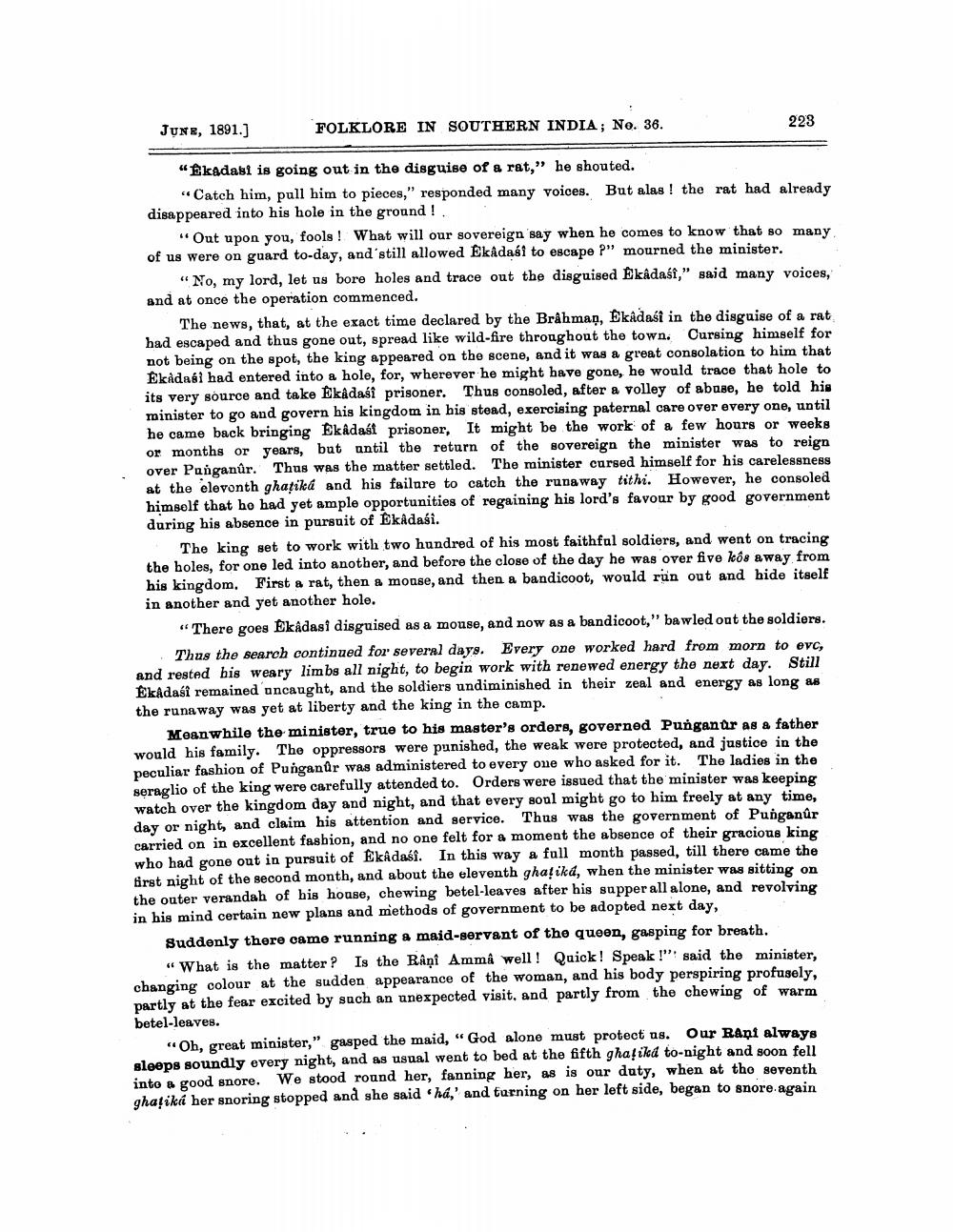________________
June, 1891.)
FOLKLORE IN SOUTHERN INDIA; No. 36.
223
"Ekadasi is going out in the disguise of a rat,” he shouted.
“Catch him, pull him to pieces," responded many voices. But alas ! the rat had already disappeared into his hole in the ground !
"Out upon you, fools! What will our sovereign say when he comes to know that so many of us were on guard to-day, and still allowed Ekadasi to escape ?” mourned the minister.
"No, my lord, let us bore holes and trace out the disguised Ekâdasi," said many voices, and at once the operation commenced.
The news, that, at the exact time declared by the Brâhman, Ekadast in the disguise of a rat had escaped and thus gone out, spread like wild-fire throughout the town. Cursing himself for not being on the spot, the king appeared on the scene, and it was a great consolation to him that Ekadasi had entered into a hole, for, wherever he might have gone, he would trace that hole to its very source and take Ekadasi prisoner. Thus consoled, after a volley of abuse, he told his minister to go and govern his kingdom in his stead, exercising paternal care over every one, until he came back bringing Ekadast prisoner, It might be the work of a few hours or weeks or months or years, but antil the return of the sovereign the minister was to reign over Panganûr. Thus was the matter settled. The minister cursed himself for his carelessness at the elevonth ghațiled and his failure to catch the runaway tithi. However, he consoled himself that he had yet ample opportunities of regaining his lord's favour by good government during his absence in pursuit of Ekadasi.
The king get to work with two hundred of his most faithful soldiers, and went on tracing the holes, for one led into another, and before the close of the day he was over five kôs away from his kingdom. First & rat, then a mouse, and then a bandicoot, would run out and hide itself in another and yet another hole.
"There goes Ekadasi disguised as a mouse, and now as a bandicoot," bawled out the soldiers.
Thus the search continued for several days. Every one worked hard from morn to evc, and rested his weary limbs all night, to begin work with renewed energy the next day. Still Ekadasi remained oncaught, and the soldiers undiminished in their zeal and energy as long as the runaway was yet at liberty and the king in the camp.
Meanwhile the minister, true to his master's orders, governed Punganur as a father would his family. The oppressors were punished, the weak were protected, and justice in the peculiar fashion of Punganûr was administered to every one who asked for it. The ladies in the seraglio of the king were carefully attended to. Orders were issued that the minister was keeping watch over the kingdom day and night, and that every soal might go to him freely at any time, day or night, and claim his attention and service. Thus was the government of Punganûr carried on in excellent fashion, and no one felt for a moment the absence of their gracious king who had gone out in pursuit of Ekadasi. In this way a full month passed, till there came the first night of the second month, and about the eleventh ghafika, when the minister was sitting on the outer verandah of his house, chewing betel-leaves after his supper all alone, and revolving in his mind certain new plans and methods of government to be adopted next day,
Suddenly there came running a maid-servant of the queen, gasping for breath."
" What is the matter? Is the Rani Ammâ well! Quick! Speak!" said the minister, changing colour at the sudden appearance of the woman, and his body perspiring profusely, partly at the fear excited by such an unexpected visit, and partly from the chewing of warm betel-leaves.
“Oh, great minister," gasped the maid, "God alone must protect us. Our Rani always sleeps soundly every night, and as usual went to bed at the fifth ghafika to-night and soon fell into a good snore. We stood round her, fanning her, as is our duty, when at tho seventh ghafiki her snoring stopped and she said hd,' and turning on her left side, began to snore again




